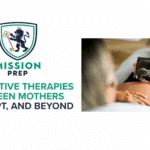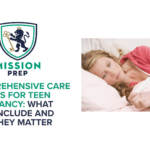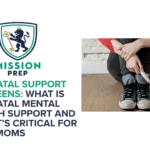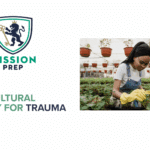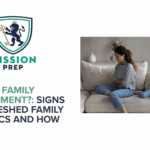The Impact of Trauma on Teen Pregnancy: Why Trauma-Informed Care Is Essential

Sometimes, when people see a pregnant teen, they might not consider the backstory. Many may assume the teen made a poor choice, but often, there’s a story that runs deeper. For instance, research shows a strong connection between trauma and teen pregnancy.¹
Childhood trauma and pregnancy sometimes go hand in hand because of early exposure to neglect, abuse, or instability. These incidents are known as “adverse childhood experiences” (ACEs).
The impact of ACEs on teen pregnancy include:²
- Early sexual activity
- Unexpected pregnancy
- Difficulty accessing support
Trauma-informed care for teen moms is essential when the mental health impact that teen pregnancy can have is considered, such as PTSD in pregnant teens. If you’re looking for help or want to help a pregnant teen in need, a mental health professional can offer much-needed guidance. This article can also help, covering all you need to know about trauma and teen pregnancy, including:
- The impact of ACEs on teen pregnancy
- Types of emotional trauma in pregnant adolescents
- What trauma counseling for teen mothers involves
- Where to get trauma support for adolescent mothers

Trauma and Teen Pregnancy: The Impact of ACEs on Teen Pregnancy
Adverse childhood experiences (ACEs) are early life stressors like neglect, abuse, or a chaotic home.³ When these happen during key developmental years, they can affect how a teen sees themselves, others, and the future.
Increased ACE scores often go hand in hand with higher rates of teen pregnancy. Not because teens who experienced trauma are careless, but because trauma can change what feels normal and safe, and how relationships are formed.
Common impacts of ACEs that may raise the risk of early pregnancy include:⁴
- Difficulty setting boundaries in relationships
- Seeking closeness or safety through intimacy
- Trouble recognizing “red flags” or unsafe situations
- Avoidance of healthcare or authority figures
- Higher rates of anxiety, dissociation, or shutdown
- Impulsivity or risk-taking as a form of escape
These patterns aren’t conscious choices. They’re adaptive responses to an environment that feels unpredictable or unsafe. When pregnancy happens in this context, teens may not only struggle with the pregnancy itself, but with shame, trust, and stability.
Understanding the impact of ACEs on teen pregnancy helps schools, providers, and families offer care that addresses the root issues, not just the outcome. For instance, trauma-informed support can reduce the cycle of re-traumatization.⁵ This can help teens build a future that feels safe from their childhood trauma and pregnancy can be healthier.
Types of Emotional Trauma in Pregnant Adolescents
When a teen becomes pregnant, the focus often shifts to physical health. But for many, the emotional toll is just as real. Some carry a history that trauma and teen pregnancy quietly bring back to the surface. Youth pregnancy and emotional trauma support is often sought after because of the types of difficulties pregnant adolescents sometimes experience. We discuss some of these difficulties in the following sections.
Emotional Fallout from Abuse, Assault, or Loss
Sometimes abuse, assault, and loss are at the heart of a teen’s mental health challenges. For example, some teens have lived through events they’ve never fully processed, like sexual abuse, physical violence, or the death of a parent. Pregnancy can reopen those wounds. As a result, what can seem like mood swings might actually be a body remembering fear. Panic, numbness, or sudden withdrawal could also point to unresolved trauma.
Living in Unsafe Conditions
Not all teens leave harmful situations when they become pregnant. Some remain in homes where yelling, threats, or controlling behavior are daily realities. In some cases, the father of the baby may also be the source of harm. When an environment feels unsafe, every decision, whether to go to school, attend a prenatal appointment, or even speak openly, gets filtered through a survival lens.
Living in ongoing fear or instability can increase cortisol levels and put the nervous system in a near-constant state of hypervigilance.⁶ Over time, this chronic stress can lead to emotional numbing, anxiety, and difficulty trusting anyone, including professionals trying to help. Consequently, teens may appear shut down or resistant when, in reality, they’re protecting themselves the only way they know how. Recognizing that behaviors such as these aren’t defiance but rather the impact of trauma and teen pregnancy in action is key to offering support that actually helps.
A Lack of Emotional Safety
In homes where a teen’s feelings were dismissed or support was scarce, a teen may have learned to handle everything alone. From the outside, this might look like strength, but it often comes with hidden exhaustion. When pregnant, these teens may not know how to ask for help – or even recognize that they’re allowed to. They may feel as if they are a burden or experience extreme discomfort asking for help.
Coercion or Exploitation
Some pregnancies result from manipulation or sexual pressure. Others follow outright assault. Teens in these situations might feel shame, confusion, or self-blame. This can make it hard to connect to their pregnancy or to talk about what happened at all.
Over time, the emotional impact of these feelings can be profound. They may struggle with intrusive thoughts, nightmares, or an urge to disconnect from their body. Even routine prenatal care can feel invasive or triggering. Without the right support, these teens are at higher risk for depression, dissociation, and emotional detachment. What they need most is a space where their experience is believed, and where healing begins with safety, not silence.
Growing Up in Chaos or Instability
Moving house often, living with someone unpredictable, or caring for siblings while a parent copes with a mental health condition. These are patterns that don’t always seem traumatic from the outside, but they can leave lasting emotional cracks. When a teen gets pregnant, those early ruptures can resurface as anxiety, fear, or emotional shutdown.
Benefits of Trauma Therapy for Young Moms
When young moms get care that takes their past into account, change becomes possible. It’s not instant, but over time, the emotional load gets lighter, and their sense of control often grows.
Trauma-informed therapy can lead to:
- Fewer symptoms of anxiety or emotional shutdown
- Improved school attendance and focus
- Healthier ways to handle conflict and stress
- Stronger attachment to their baby
- More confidence in parenting choices
- A better sense of self and future direction
Healing with trauma therapy for young moms doesn’t erase the past, but it does make room for something new.
What Trauma Counseling for Teen Mothers Involves
Teen pregnancy and mental health counseling is often overlooked, but the reality is that it can be a reprieve for many teens struggling with past trauma. For example, one study shows that many pregnant teens report being triggered during pregnancy and postpartum.⁷ For many teens, counseling is the first time someone listens without judgment.
At Mission Prep, support for teen mothers always starts with understanding their emotional world. Trauma counseling isn’t one-size-fits-all. In fact, trauma recovery for teen moms needs to be flexible, personal, and grounded in what actually helps. This is why we offer a variety of therapies, focusing on what each teen has been through and what they’re ready for. These options include the following.
CBT (Cognitive Behavioral Therapy)
Some teens get stuck in loops of self-blame or fear. CBT helps teens see how certain thoughts affect what they feel and do. ⁸ At Mission Prep, we use CBT to help teen moms untangle cognitive patterns so they can respond instead of react, even under pressure.
TF-CBT (Trauma-Focused Cognitive Behavioral Therapy)
When trauma is part of the story, regular CBT isn’t always enough. TF-CBT adds tools for handling flashbacks, fear responses, and shame.⁹ It’s especially useful when PTSD symptoms show up during pregnancy or early parenting, as these are times when emotional stability matters most.
EMDR (Eye Movement Desensitization and Reprocessing)
For some teens, talking about trauma feels impossible. EMDR offers another route. It lets the brain process distressing memories through guided eye movement or tapping, without needing to relive the whole story out loud.¹⁰
Group Therapy
It’s hard to feel seen when no one else understands what you’re going through. Group therapy connects teen moms to each other. Sometimes, just hearing “me too” is enough to shift how alone someone feels. Plus, these groups aren’t about venting; they’re about building strength in community.
Family Therapy
When relationships at home feel tense or distant, it’s harder to stay mentally steady. Family sessions at Mission Prep are designed to open communication and reduce conflict. This might mean helping a parent understand their teen’s emotional needs or helping a co-parent show up more consistently.
Each of these therapeutic approaches has a role to play. Some teens need structure. Others need compassion. We start by listening, and then tailor care to meet each teen where they are.

Mission Prep: Providing Trauma Support for Adolescent Mothers
Not every teen pregnancy starts with a clean slate, meaning mental health services for trauma may be needed. Some young mothers carry stress, fear, or pain from earlier life, and it can show up in ways that can be hard to name. At Mission Prep, we understand how trauma and teen pregnancy shape thoughts and emotions, as well as how safe a teen feels in the world.
Our team specializes in trauma-informed care for teen moms, advising on safe environments for pregnant teens struggling through trauma. While we can provide support after abuse for pregnant teens, we also offer support for families when it helps rebuild trust or improve communication.
If your teen is feeling overwhelmed, disconnected, or unsure how to move forward, Mission Prep can help. Contact our team for more advice today.
References
- Hillis, S. D., Anda, R. F., Dube, S. R., Felitti, V. J., Marchbanks, P. A., & Marks, J. S. (2004). The association between adverse childhood experiences and adolescent pregnancy, long-term psychosocial consequences, and fetal death. Pediatrics, 113(2), 320–327. https://pubmed.ncbi.nlm.nih.gov/14754944/
- Bangor University. (n.d.). Adverse childhood experiences and adolescent pregnancy. Bangor.ac.uk. Retrieved June 6, 2025, from https://pure.bangor.ac.uk/ws/portalfiles/portal/48870267/ijerph_19_08869.pdf
- Centers for Disease Control and Prevention. (2024, September 19). Adverse childhood experiences (ACEs). https://www.cdc.gov/vitalsigns/aces/index.html#:~:text=Overview,one%20generation%20to%20the%20next
- Hughes, K., Bellis, M. A., Hardcastle, K. A., Sethi, D., Butchart, A., Mikton, C., Jones, L., & Dunne, M. P. (2017). The effect of multiple adverse childhood experiences on health: A systematic review and meta-analysis. The Lancet Public Health, 2(8), e356–e366. https://www.sciencedirect.com/science/article/pii/S2468266717301184
- Goddard, A. (2021). Adverse childhood experiences and trauma-informed care. Journal of Pediatric Health Care, 35(2), 145–155. https://pubmed.ncbi.nlm.nih.gov/33129624/
- Feriante, J., & Sharma, N. P. (2025). Acute and chronic mental health trauma. In StatPearls. StatPearls Publishing. https://www.ncbi.nlm.nih.gov/books/NBK594231/
- Millar, H. C., Lorber, S., Vandermorris, A., Thompson, G., Thompson, M., Allen, L., Aggarwal, A., & Spitzer, R. F. (2021). “No, you need to explain what you are doing”: Obstetric care experiences and preferences of adolescent mothers with a history of childhood trauma. Journal of Pediatric and Adolescent Gynecology, 34(4), 538–545. https://www.sciencedirect.com/science/article/abs/pii/S1083318821000085
- Chand, S. P., Kuckel, D. P., & Huecker, M. R. (2025). Cognitive behavior therapy. In StatPearls. StatPearls Publishing. https://www.ncbi.nlm.nih.gov/books/NBK470241/
- Jensen, T. K., Holt, T., Ormhaug, S. M., Egeland, K., Granly, L., Hoaas, L. C., Hukkelberg, S. S., Indregard, T., Stormyren, S. D., & Wentzel-Larsen, T. (2014). A randomized effectiveness study comparing trauma-focused cognitive behavioral therapy with therapy as usual for youth. Journal of Clinical Child and Adolescent Psychology, 43(3), 356–369. https://pmc.ncbi.nlm.nih.gov/articles/PMC4037845/
Gainer, D., Alam, S., Alam, H., & Redding, H. (2020). A flash of hope: Eye movement desensitization and reprocessing (EMDR) therapy. Innovations in Clinical Neuroscience, 17(7–9), 12–20. https://pmc.ncbi.nlm.nih.gov/articles/PMC7839656/

